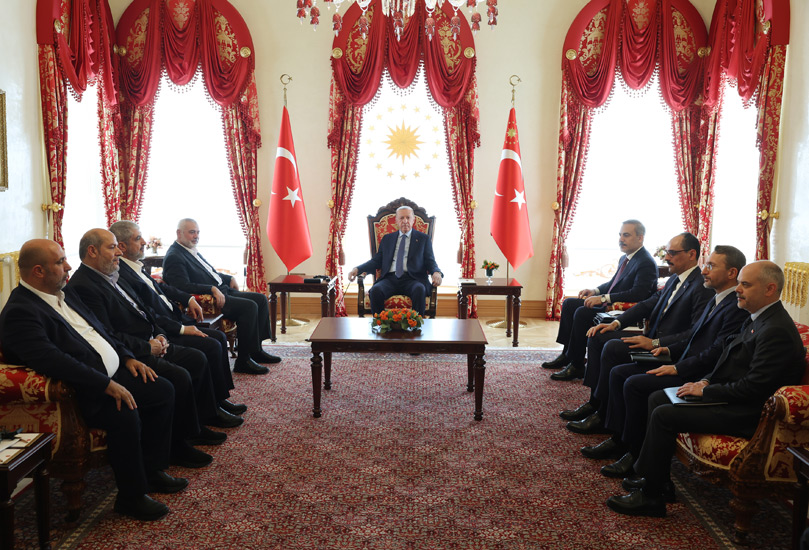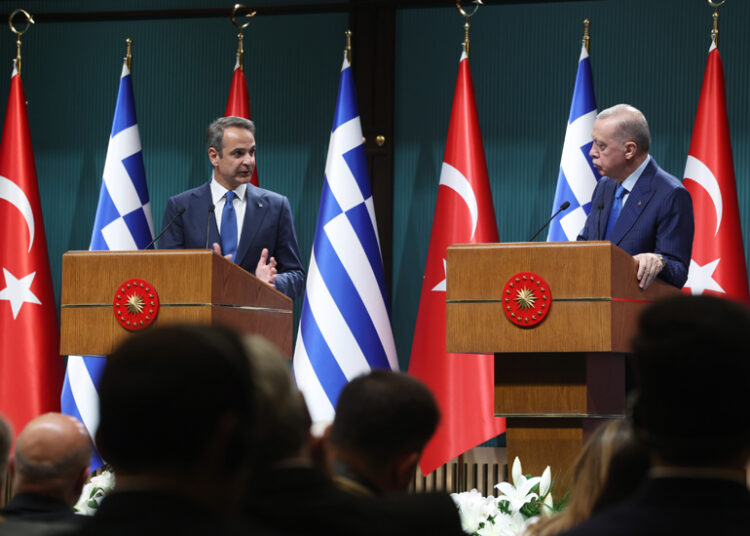Levent Kenez/Stockholm
Turkish President Recep Tayyip Erdogan got a major surprise in the local elections held on March 31, with his party experiencing a historic setback by landing in second place for the first time in its history. Polls conducted to analyze Erdogan’s failure in the elections attributed it to ongoing economic challenges and Turkey’s continuation of trade relations with Israel.
Following the March 31 elections, the Erdogan government, in a series of measures, first introduced certain restrictions on Turkey’s trade with Israel. Then, on May 3, it announced the complete cessation of trade between the two countries.
After the local elections, Erdogan also made his support for Hamas more visible and intensified it. His recent hosting of Hamas leaders in Istanbul on April 27, coupled with an unprecedented endorsement of the jihadist group, underscored Turkey’s decision to elevate relations with an organization known for perpetrating acts of terror against civilians. This move, marked by a significant reference to Turkish history by Erdogan, signals an alarming new shift in Turkey’s foreign policy approach.

Erdogan’s characterization of Hamas as resistance fighters, likening them to Kuvay-i Milliye (Turkey’s National Forces), an irregular militia crucial in Turkey’s War of Independence following World War I, marks an important turning point. This comparison not only legitimizes Hamas within the broader Turkish public sphere but also opens the door for increased support for the jihadist group from Turkish government agencies and affiliated organizations.
In an address to party lawmakers on May 15, Erdogan emphasized Turkey’s support for Hamas, stating, “Critics, both domestic and foreign, are quick to criticize us for our support of Hamas. However, let me clarify: Israel’s aggression in Gaza will not stop, nor will Ramallah find security.
“If this aggressive and terrorizing state is not halted, it will inevitably turn its eyes to Anatolia, fueled by its delusions of ‘promised lands.‘ Israel’s assaults in Gaza not only target Palestinians but also pose a threat to us. Hamas, based in Gaza, serves as the frontline defense of Anatolia. Are we blind to this reality? Have we lost our ability to understand? Some were uneasy when I likened Hamas to the Kuvay-i Milliye. Why did that comparison unsettle them?”
Pro-Erdogan media influencers frequently cite Hamas’s close relationship with Erdogan, particularly to the Islamist grassroots. They often post content suggesting that if Turkey’s trade relations with Israel were truly problematic, Hamas would have reacted first.
Erdogan’s team also intensified their public relations efforts targeting the Muslim community. For instance, Erdogan’s propagandist in the Islamic world, the International Union of Muslim Scholars (IUMS), has expressed its approval of Erdogan’s refusal to label Hamas as a “terrorist” organization, instead describing it as a “resistance movement defending its occupied lands.”
In a written statement reported by Turkey’s state-run Anadolu news agency, the IUMS highlighted Erdogan’s rejection of Greek Prime Minister Kyriakos Mitsotakis’s characterization of Hamas as a terrorist group. Erdogan’s stance, viewing Hamas as a movement resisting occupation, was met with satisfaction by the organization.
The IUMS also praised Erdogan’s remarks on the subject, stating: “This speech represents a victory for the oppressed, a battle against oppressors, a triumph for God’s allies and a struggle against the enemies of God. It has provided comfort to the hearts of the oppressed worldwide, reaffirming that Turkey stands with them and has not changed its direction or allegiance.”
The statement commended Erdogan’s “strong declarations and honorable stance,” noting that he has earned the prayers and support of Muslim scholars and the Islamic community. It also drew parallels between Erdogan’s position on Palestinian lands and the approach of Ottoman Sultan Abdulhamid II, who refused to sell land to early Jewish settlers.
The IUMS, affiliated with the Muslim Brotherhood and designated as a terrorist organization by Egypt, Saudi Arabia, the UAE and Bahrain in 2018, enjoys political protection, diplomatic support and financial aid from Turkey and Qatar.
Many Hamas figures, including some senior leaders, have been residing and operating in Turkey with the protection and support of the Erdogan government. Turkish intelligence agency MIT has provided protective details for some Hamas leaders and has played a role in establishing headquarters for Hamas leadership in Istanbul.
While some Hamas front companies have been sanctioned by the US, they continue to conduct business and access the Turkish financial and banking system without hindrance. Additionally, some Hamas officials changed their names after acquiring Turkish citizenship to conceal their identities.












